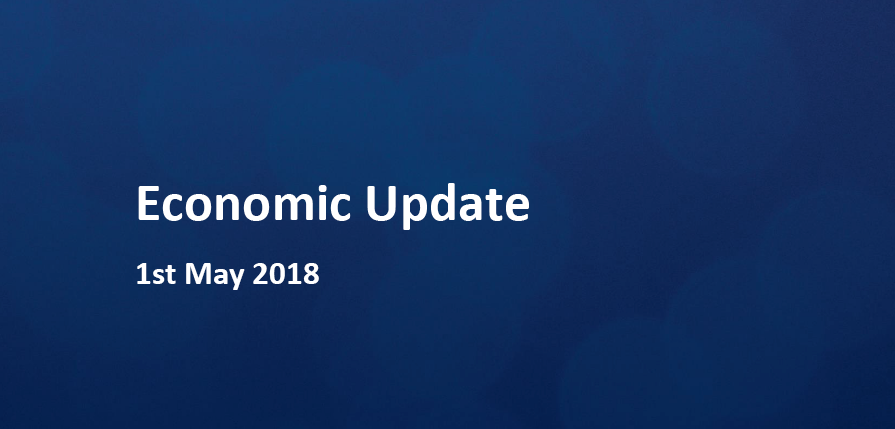Economic Update May 2018
Within this month’s update, we share with you a snapshot of economic occurrences both nationally and from around the globe.
- Australian share market recovers
- United State (US) economy seen as strengthening
- Royal Commission casualties
- Korean peninsula frictions easing
We hope you find this month’s Economic Update as informative as always. If you have any feedback or would like to discuss any aspect of this report, please contact your Financial Adviser.
The Big Picture
After two challenging months for equity markets, April turned out an impressive +3.9% for the ASX 200 but only +0.3% for the S&P 500 on Wall Street. Even better for Australia – that big gain was made up of four consecutive weeks of all positive gains. Low volatility returned.
The dominant negative influence on Wall Street was the ‘tech rout’. A number of mega tech companies like Apple suffered significant price corrections. That we do not have such a tech sector in Australia explains in part how we avoided much of the US volatility.
The US produced an impressive company reporting season with about 80% of companies beating analysts’ expectations with their Q1 earnings reports.
The US Federal Reserve (‘Fed’) produced minutes of its last meeting with a strong assessment of the US economy. It led the Fed to hold the line on there being three rate hikes in 2018 but possibly increasing the pace in the following two years.
The US reported slightly weaker economic growth for quarter one but a big beat on Retail Sales for the month. US jobs did come in well under expectations for the month but that followed an exceptionally strong report the previous month. The average of two months’ data was about on expectations.
China posted above-expectations, with economic growth at 6.8%. The April Purchasing Managers’ Index (PMI) for manufacturing came in at a solid 51.4. Talk of trade wars between the US and China appears to be taking on a more conciliatory tone.
At home, the Royal Commission into the Financial Services Industry produced some casualties. AMP’s chairman resigned as a result of certain findings. A high-profile financial planner (and principal) is reported to have lost all of his regular spots on TV and in the press for allegedly ‘bad’ advice. A UBS analyst put a ‘Sell’ recommendation on Westpac after assessment of evidence on its home loan book. Westpac’s stock price took an immediate tumble.
The Reserve Bank of Australia (RBA) kept rates on hold in April and again at the May meeting. With inflation coming in at 0.4% for the quarter and 1.9% for the year, this economic indicator is still below the RBA’s target range of 2% to 3%.
Our jobs report continues to see underlying growth in full-time jobs slipping month-by-month but it is still positive. The unemployment rate is stuck at around 5.5% which is well above most people’s estimates for full employment.
Japan emphasised the need to keep monetary policy loose until inflation gets above two per cent. The European Central Bank also reaffirmed that it will not start hiking rates anytime soon. UK economic growth, coming in at only 0.1% for the quarter, means that hikes anytime soon are unlikely. Policy makers around the world seem to be coordinated and in tune with keeping global growth on track for a strong 2018 and 2019.
While President Trump continues to be unpopular in the media and elsewhere, he scored two big wins in April. A joint US-UK-France missile mission attacked terrorist cells in Syria further reducing the likelihood of global unrest from terrorists. In addition, the North Korean president Kim Jong Un walked across the border to South Korea to meet his opposite number. Trump is also reportedly planning a meeting with Kim Jong Un. North and South now have a ‘hotline’ for immediate contact. This sentiment is a far cry from the fear of nuclear attacks from North Korea a few months or more ago. Trump stressing that he had a ‘bigger button’ seems to have worked even if reporters scoffed at the time!
Apart from the controlled unwinding of an overbought tech sector in the US, the world economy and markets seem back on track for stable growth prospects.
Asset Classes
Australian Equities
Our ASX 200 gained in April what largely it had lost in March. Resource stocks and the Healthcare sector were particularly strong performers. A more stable outlook for China and commodity prices helped resources.
Market volatility is back down to below long-term average levels and our index is once again ABOVE the 6,000 level. The total returns for the index – that is including reinvested dividends but not franking credits – for the financial year to date is a reasonable, but not stellar, 8.3%. But, with franking credits, that return rises to about 9.5%.
Foreign Equities
Major indexes such as Japan’s Nikkei, the London FTSE and the German DAX all had an even stronger April than Australia but the Wall Street S&P 500 index only produced a modest return of 0.3%.
Apple’s sales of iPhones are reportedly seen as under-performing; Amazon is being berated by Trump over his perception of its abuse of the US postal service; and Intel’s chip-making business is seen as losing demand as Apple plans to take manufacture of chips in-house by 2020. All-in-all the tech sector had a bad April.



